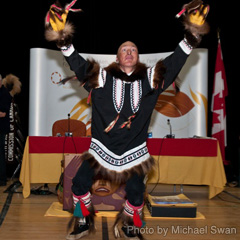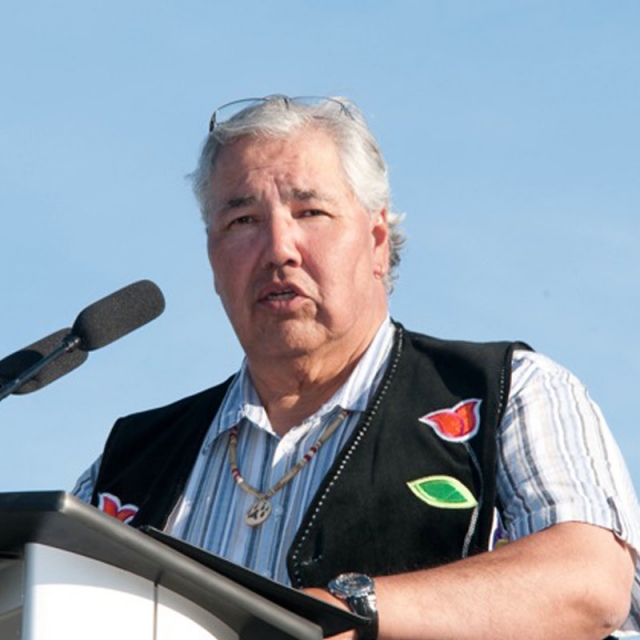Lavoie, archbishop of Keewatin-Le Pas, isn't quite ready to give up the evangelical mandate of the Church. He believes a well-rounded Catholicism can be part of native culture — just as it is part of other cultures. But that doesn't mean the Church is going to force Catholicism on anybody, he said.
"People are going to choose whatever they're going to choose," said Lavoie. "They have to be free to do that.
"Why would I advise somebody to let go of something that could be a great help to them?"
For many of the people recovering from abuse at the schools there has been a rediscovery of faith that begins with recovery from alcohol abuse with a 12-step program, followed by embracing native spirituality and finally a discovery of an authentic Catholic identity.
The three supports of a healthy spirituality form what Lavoie calls "teepee spirituality." The Church's support for native culture begins with help for families — whether through ordinary, daily ministry or through special programs, said Lavoie.
The Church's support for native culture begins with help for families — whether through ordinary, daily ministry or through special programs, said Lavoie.
"Relationship and family are everything to native people," he said.
But it also extends to continuing efforts to preserve aboriginal languages. While not denying the tragic role Church-run residential schools played in forced assimilation and cutting children off from their mother tongues, Lavoie points out many of the best grammars and dictionaries of Canada's 55 aboriginal languages were written by Catholic missionaries. In his diocese today, in addition to Lavoie's own efforts to learn Cree, four priests are learning the native language of their communities.
The example of priests willing to learn the languages should encourage native people, showing that it can be done, said Lavoie. But the Church can't do it alone. The culture and languages won't survive without schools and parents committed to speaking aboriginal languages with children, he said.
"Once you lose the language, you lose your culture," Sinclair warned.
The biggest challenge to Church efforts to engage native culture is the lack of clergy and lay missionaries to staff rectories dotted across the north, said Lavoie. The four priests learning Cree in his diocese are all foreign missionaries who have come to Canada from Africa or Asia.
Reconciliation between aboriginal Canada and the colonizing nation isn't going to come easy, said Inuvialuit language consultant Allen Maghagak.
"I can't accept the Prime Minister's (2007) apology as long as there is no plan so that we can benefit from that apology," he said. "Policy with no money is no policy."
He's similarly skeptical of Church apologies that began much earlier with the Oblate apology in 1991.
"Churches cannot just be allowed to keep apologizing," he said.
Without comprehensive mental health programs, healing in native communities will be impossible, Maghagak said.
"We're with the people every day," said Mackenzie-Fort Smith Bishop Murray Chatlain.
Reconciliation will be a life-long project of walking with native people, said Whitehorse Bishop Gary Gordon. "I've been doing this the last 20 years. I'm going to continue doing this for the next 30 years."
Church wants to be part of recovering native identity
By Michael Swan, The Catholic RegisterINUVIK, N.W.T. - The Church in the north can help native people recover their languages and cultural identity, but it won't be easy, said Oblate Archbishop Sylvain Lavoie at the conclusion of four days of testimony about the damage residential schools did to native families, communities and culture.
Justice Murray Sinclair, chief commissioner of the Truth and Reconciliation Commission of Canada with a five-year mandate to investigate the history of the schools, wrapped up the TRC's Northern National Event in Inuvik July 1 with a warning to aboriginal participants in the Commission's hearings that they will have to take responsibility for the future of native culture.
"The Church can't give you back your language. The Church can't give you back your culture," Sinclair told about 400 people who attended the closing ceremonies for the event.
Sinclair told churches they would have to tell people they don't have to be Christian if they really want reconciliation.
Please support The Catholic Register
Unlike many media companies, The Catholic Register has never charged readers for access to the news and information on our website. We want to keep our award-winning journalism as widely available as possible. But we need your help.
For more than 125 years, The Register has been a trusted source of faith-based journalism. By making even a small donation you help ensure our future as an important voice in the Catholic Church. If you support the mission of Catholic journalism, please donate today. Thank you.
DONATE
